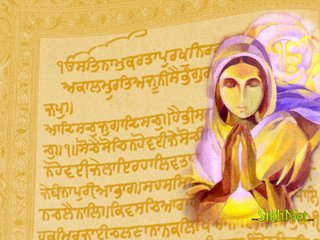May I recite Guru Ji's Bani?
 "Sikh women today are not only aware of their rights, roles and rigors, but they are also scripting narratives of their trials and tribulations in a multicultural setting. Their involvement in religious matters is germane to their essence and a source of inspiration for their families and friends. They are out to change the attitude of world in general and Sikhs in particular. They are leading strong movements against race, class and gender discrimination in educational institutions and at work places. Their encounter with the rest of the world has strengthened their identity as Sikhs and they are further exploring scriptures and history for supporting their assertive representation..." - Panthic Weekly
"Sikh women today are not only aware of their rights, roles and rigors, but they are also scripting narratives of their trials and tribulations in a multicultural setting. Their involvement in religious matters is germane to their essence and a source of inspiration for their families and friends. They are out to change the attitude of world in general and Sikhs in particular. They are leading strong movements against race, class and gender discrimination in educational institutions and at work places. Their encounter with the rest of the world has strengthened their identity as Sikhs and they are further exploring scriptures and history for supporting their assertive representation..." - Panthic WeeklyMany young Sikh women look forward in doing Seva at the Gurdwara. Many take part in serving langar, doing kirtan, or teaching Gurbani. Their involvement in Seva at the Gurdwara has become a source of inspiration for their families, friends, and other Sikh women. Although, many women have stepped up to the plate and started to break down these barriers for the next generation of Sikh women, there is still a lack of women participating in reciting Guru Ji’s Bani from Sri Guru Granth Sahib Ji. A question that many of us hear, especially from Sikh Women, “Can I recite Bani from the Sri Guru Granth Sahib Ji within the Gurdwara/Sangat?”
“Guru Nanak Dev hasn’t left any iota of doubt about the significance of women in society. In fact distancing women from the center is undesirable in Sikh society. They aren’t only natural and nurturing influence on Sikh seminaries, but also an integral part of the spiritual growth of the Sikh society.” - Panthic Weekly
According to Guru Ji’s teaching and Sikhi beliefs, the answer is, yes, Sikh men and Sikh women are allowed to recite Bani from Sri Guru Granth Sahib Ji. The following article is intended to strengthen the courage of young Sikh women to participate in reciting of Bani within the Gurdwara/Sangat.
Bibi Amro ji
Bibi Amro ji was the daughter of Sri Guru Angad Dev ji, the Second Guru. She was born in 1532 in the village
 of Khadur Sahib, District Amritsar. She received her early education and training directly from her parents Sri Guru Angad Dev ji and Mata Khivi ji.
of Khadur Sahib, District Amritsar. She received her early education and training directly from her parents Sri Guru Angad Dev ji and Mata Khivi ji.Sri Guru Angad spent a lot of time with his children. He taught them the Gurmukhi script that he had revised and simplified which is used in Sri Guru Granth Sahib Ji. When she came of age she was married to Bhai Jasoo on of Manak Chand of Basarke village.
As was the custom of the day she was sent to live with her husband’s family. Her father encouraged her to continue doing Kirtan and to preach Sikhism to all that she came in contact with. There lived a very devout Vaishanavite Hindu named Amar Das, who was Bibi Amro’s uncle. One day he heard Bibi Amro who was recently married to his nephew singing the hymns of Sri Guru Nanak Dev Ji. It has been noted by some scholoars that Bibi Amro was reciting:
maaroo mehalaa 1 ghar 1
Maaroo, First Mehl, First House:
karanee kaagadh man masavaanee buraa bhalaa dhue laekh peae
Actions are the paper, and the mind is the ink; good and bad are both recorded upon it.
jio jio kirath chalaaeae thio chaleeai tho gun naahee a(n)th harae 1
As their past actions drive them, so are mortals driven. There is no end to Your Glorious Virtues, Lord. 1
chith chaethas kee nehee baavariaa
Why do you not keep Him in your consciousness, you mad man?
har bisarath thaerae gun galiaa 1 rehaao
Forgetting the Lord, your own virtues shall rot away. 1Pause
jaalee rain jaal dhin hooaa jaethee gharree faahee thaethee
The night is a net, and the day is a net; there are as many traps as there are moments.
ras ras chog chugehi nith faasehi shhoottas moorrae kavan gunee 2
With relish and delight, you continually bite at the bait; you are trapped, you fool - how will you ever escape? 2
kaaeiaa aaran man vich lohaa pa(n)ch agan thith laag rehee
The body is a furnace, and the mind is the iron within it; the five fires are heating it.
koeilae paap parrae this oopar man jaliaa sa(n)nhee chi(n)th bhee 3
Sin is the charcoal placed upon it, which burns the mind; the tongs are anxiety and worry. 3
bhaeiaa manoor ka(n)chan fir hovai jae gur milai thinaehaa
What was turned to slag is again transformed into gold, if one meets with the Guru.
eaek naam a(n)mrith ouhu dhaevai tho naanak thrisattas dhaehaa 43
He blesses the mortal with the Ambrosial Name of the One Lord, and then, O Nanak, the body is held steady. 43
Amar Das started to listen to them every day until he was enchanted by them. Bibi Amro told Amar Das about the mission of Sri Guru Nanak Dev Ji and promised to introduce him to her father Sri Guru Angad Dev Ji.
It was she who first introduced him to the teachings of Sikhism. As his interest grew it was she who sent him to her father to learn more about these teachings.
Sri Guru Amar Das Ji was so deeply influenced by Sri Guru Angad Dev Ji that he became a devout Sikh, so much that Sri Guru Angad Dev ji announced him as his Successor.
"...Thus Sri Guru Amar Das ji, the third Guru got to his destiny of becoming a Guru through Bibi Amro ji..."
Years later when Sri Guru Amar Das ji gave structure to the Sikh Nation and organised his preachers into 22 teaching districts he put Bibi Amro ji in-charge of on of these districts called Manji. What Manji meant was that a person who was leading a Kirtan to be sit on the Manji while whole Sangat in front of Him.
The person occupying Manji was the Sikh preacher appointed by Sri Guru Amar Das Ji. This appointment can best be compared to the position of Bishop in the Christian Church today. It was an administrative position, with full responsibility for the equality and content of the preaching’s. She also would have the responsibility of collecting revenues and making decisions for the welfare of her diocese. Her Manji or diocese included Basarke, her husband’s village, where they made their home.
It is the direct result of the efforts of Bibi Amro ji and other Sikh preaches that Amritsar today is synonymous with Sikhism. Today, close to the village of Basarke, there is a tank (man made pond) bearing the name Bibi Amro da Talab (Tank of Bibi Amro) in her memory.
Thus, Sri Guru Amar Das Ji was initated into Sikhi by Bibi Amro, the Daughter of the Second Guru, Sri Guru Angad Dev Ji. Sri Guru Amar Das Ji was so impressed by her way of reciting Guru Ji’s Bani, “He decided to completely sacrifice his ego to the will of the Guru.” 
Fortunately living in the West, many Sikh women do not feel discrimination when attending the Gurdwara or while sitting amongst the Sangat. However, it is vividly clear that in Punjab, India, where Sikhi was born, women are still fighting for their rights to do certain Seva in the Gurdwara. It is the duty of the Daughters of the Khalsa who are living in the West to be ideal examples for Sikh women in India, to follow our footsteps in achieving equal rights.
"Rites and rituals have no place in Sikh thought if they are observed only for their own sake. If any tradition is divorced from its objective, it is going to be counterproductive to the spirit of Sikhism. The purpose behind all practices is to create personal integrity, devotion, dedication and the spirit of sacrifice for the service of mankind. Who can better inculcate these values than enlightened Sikh women?" – Panthic Weekly
Pictures courtesy of: Sikhnet.com; Article from Alice Basarke "The Champion of Women."; Quotes from Panthic Weekly Read More
Comments:
Amazing article ji...the yellow just made it a bit hard to read, or maybe there is something wrong with my eyes. Anyways, keep it up ji.
Waheguru Ji Ka Khalsa Waheguru Ji Ki Fateh
thanks
George,
bani.


